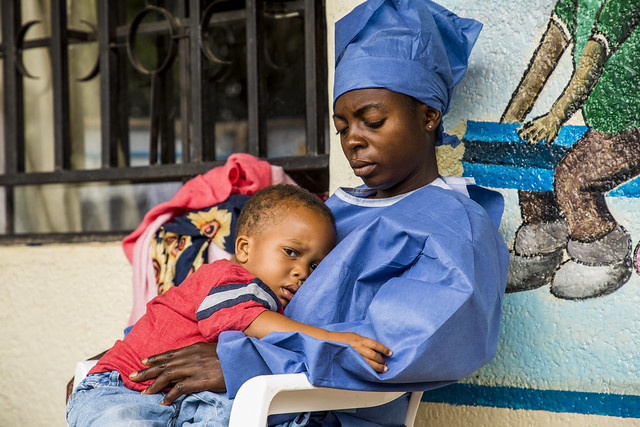An App Joins the Fight Against Ebola in Congo
 Boasting over 85 million people, Congo has struggled with political and social instability since the Belgian conquest in the early 20th century. To this day over 100 armed groups, including the Allied Democratic Forces, the Mai Mai and the Forces of the Liberation of Rwanda, are active in Congo. Against this backdrop of factionalism and violence quietly rages the second most deadly Ebola outbreak in history. Over 1,600 people have died. Despite these grim circumstances, a group of Congolese tech-savvy youth have developed an unlikely weapon against Ebola: an app they’ve called Lokole.
Boasting over 85 million people, Congo has struggled with political and social instability since the Belgian conquest in the early 20th century. To this day over 100 armed groups, including the Allied Democratic Forces, the Mai Mai and the Forces of the Liberation of Rwanda, are active in Congo. Against this backdrop of factionalism and violence quietly rages the second most deadly Ebola outbreak in history. Over 1,600 people have died. Despite these grim circumstances, a group of Congolese tech-savvy youth have developed an unlikely weapon against Ebola: an app they’ve called Lokole.
Fighting Ebola in Congo
Ebola is a virus that first causes fever, sore throat and muscle weakness and later progresses to vomiting, diarrhea as well as internal and external bleeding. Patients die due to dehydration and multiple organ failure. During the West African epidemic of 2014 to 2016, over 11,000 people died. During this epidemic, the investigational vaccine called rVSV-ZEBOV was used to fight the outbreak in Congo. However, it was used under the compassionate use clause because the vaccine had not been commercially licensed.
In addition, the Congolese Ministry of Health is seeking medical interventions through technological tools . Through collaboration with Internews and Kinshasa Digital, it organized a hackathon in March 2019, bringing 50 students in communications, medicine, journalism and computer science together. These students were sorted into teams of approximately seven.
Each team sought to answer the question: “How can Ebola response teams leverage new technologies to achieve their communication goals at the local, national and international level?” Thrown together for the first time, Emmanuel, Ursula, Aurore, Joel, David, Israël, and Maria worked for 24 hours. There, they came up with Lokole, the winning technology.
Introducing the Lokole App
Lokole is an Unstructured Supplementary Service Data (USSD) mobile application which “is designed to facilitate the real-time transmission of data and information between communities and the Ebola response teams,” despite poor internet connectivity in rural areas. This team of seven chose the name Lokole because a lokole is a traditional Congolese drum used to transmit messages over long distances. With this app, they hope to increase communication about the spread of Ebola in Congo.
USSD technology is a text-based communication system used by Global System for Mobile Communication (GSM) cellphones. Even though text-based communication might seem outdated with smartphones in the picture, smartphone use across Africa is at less than 35 percent. Plus, those with smartphones might not have access to data plans. As such, a real-time mobile to mobile communication platform based on USSD technology is inherently more inclusive, useful and cheaper.
The Lokole app allows community workers to note and document Ebola symptoms through questionnaires which are then relayed to Ebola response teams and the Ministry of Health. David Malaba, one of the app’s developers, says “Real-time management of information by the different components of the Ebola response will help detect and provide treatment to patients more quickly and deploy resources on the ground more swiftly, which will help lower Ebola mortality rates.”
While analog in comparison to smartphone technology, Lokole’s USSD platform offers the potential for real-time communication without having to invest in widespread expensive improvements in Congo’s internet connectivity infrastructure.
Changing the Future of Grassroots Healthcare
Since the virus’s discovery in 1976, Congo has had 10 documented Ebola outbreaks. Years of consistent violence has led to great mistrust of government and health authorities. Such widespread mistrust of health systems makes epidemics like Ebola even harder to combat.
However, Lokole empowers the everyday Congolese with the tools to fight Ebola. It is a democratic grassroots healthcare model. In fact, large-scale telemedicine platforms, such as BabylRwanda in Rwanda, are powered by similar USSD technology. This connects the average citizen with a nurse or physician in a matter of minutes.
The development of the Lokole app is exciting in its fight against Ebola in Congo, but the galvanization of local Congolese talent is a game-changer. Hackathons that bring disparate youth together to problem solve big and often overwhelming issues inspire others to pursue change. Lokole is just the beginning.
– Sarah Boyer
Photo: Flickr
